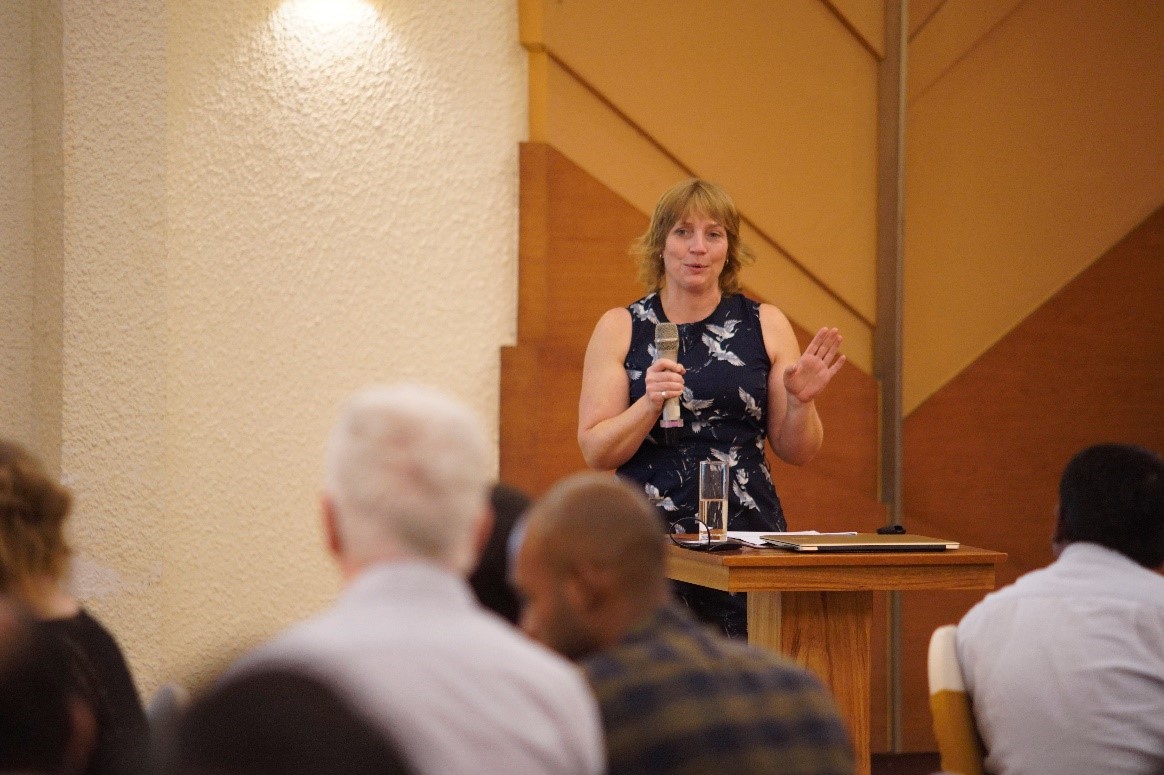
Image: Bella presenting at the workshop | Minh Tan
Bella Starling, a Wellcome Engagement Fellow and Co-Director of Public Programmes at Manchester University NHS Foundation Trust in the UK, presented on ‘people-powered research’ and the role of leadership in community and public engagement (CPE) to attendees of the 2018 Wellcome International Engagement Workshop. She argued that leadership and growth is about sharing, supporting and collaborating with others, which can sometimes go against the competitive nature of academic science. Bella proposed that public engagement leaders have the power to bridge gaps and help researchers share and support each other in all of their work.
For Bella, leadership is:
- sharing and supporting others
- collaboration as a mark of success
- having the confidence to tread your own path
- filling the space between formal and informal structures
- being authentic and exploring creativity
Video: Bella discussing her keynote speech at the 2018 Wellcome International Engagement Workshop | Mesh
Bella also discussed how CPE practitioners operate at the intersection between formal and informal environments – the worlds of academics, healthcare professionals, and community and patient groups. She argued that there is no formal definition of leadership in this space, so it has to “tread its own path”.
For growth in the public engagement sector to occur, there needs to be recognition that the separate paths – those of informal and formal workers in different sectors – work in parallel, interweaving and complementing each other. There is no hierarchy, and one is no more important than the other. Bella had in the past been referred to as a “jack of all trades”, balancing many different skills; a sentiment many public engagement professionals will surely have felt. This flexibility is often not valued, and this negative perception contributes to the field still being seen by some as “fluffy”. To combat this, Bella argues public engagement professionals must take pride in their skills, knowledge and attributes, and feel masterful at a number of different skills. CPE professionals must make the case that good research cannot happen without good engagement.
In her blog to accompany the presentation, Bella lists the following skills and attributes as examples of those held by CPE professionals:
- “The ability to distil, and be crystal clear about, the purposes and potential outcomes for engagement (not always an easy task!) – often at the eleventh hour
- Strategic thinking and planning, often with very limited resources
- Relationship management and teamwork working with a huge variety of people and patients, academic and research disciplines, creative partners and cultural organisations
- At times, transforming conflict (or perceived conflict) into productive thinking partnerships
- Sensitive, skilled and precise facilitation skills
- Influencing skills, tact and assertiveness
- Emotional intelligence; people and social skills, working across the disenfranchised to the highly corporate, the enthusiasts and the nay-sayers
- Clear and accurate communication skills, with a healthy dislike of jargon
- Creative flair and talent to inspire and engage
- Mastery of an arsenal of engagement and involvement methods, and generally getting stuff done
- Resilience (in bucket loads)
- Incisive impact and evaluation skills at project, programme and strategic levels
- Passion, drive and commitment
- The ability to understand and unpick complex and wide-ranging areas of scientific research in order to understand how to do ‘good’ public engagement and involvement
- A thorough appreciation of research methodologies, ethics and governance processes…
Need I go on?”
As a public engagement professional, leadership in this boundary space often involves storytelling, to gain buy-in from senior leadership but also to connect all the people you work with. Using storytelling skills allows you to tap into emotions, which are a critical part of engagement work; professionals should not be afraid of this. This includes your own emotions as a CPE professional, which means acceptance of failure and self-reflection. By being authentic with your own emotions, sharing stories with those you want to engage with, and knowing your own skills and strengths, you can become a great leader in engagement.
Download Bella’s presentation slides here, or read her blog here to see more.
---
The content on this page forms part of the online report for the 2018 International Engagement Workshop “Taking it to the Next Level: How can we generate leadership and develop practice in engagement?". To learn more about the workshop, access the rest of the report and browse the video presentations, discussion summaries, and tools, visit the workshop page.

This work is licensed under a Creative Commons Attribution 4.0 International License.

Please Sign in (or Register) to view further.